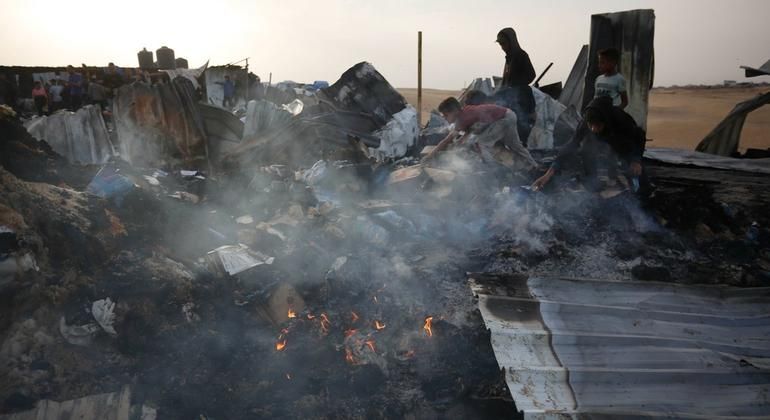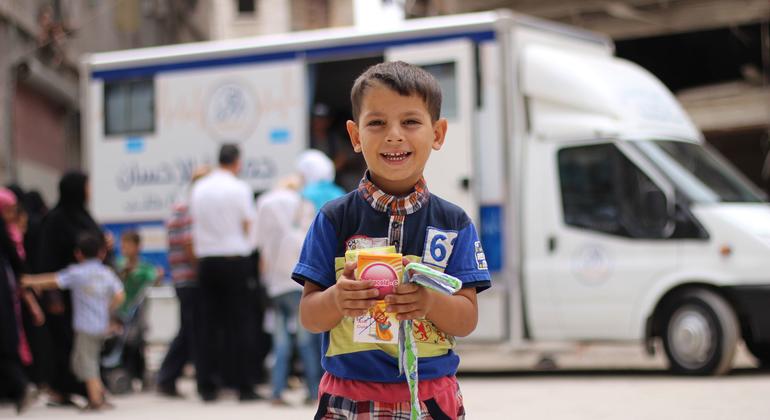Many of the wounded suffered terrible burns, according to the World Health Organization (WHO), which will require intensive treatment, electricity and high-level medical services, all of which are in short supply after almost eight months of war.
Great medical challenge
This is just another huge challenge for all medical teams in the enclave, WHO spokeswoman Margaret Harris told reporters in Geneva.
“This is one of the most difficult things for a doctor or nurse, because you want to help, but you don't have what it takes,” Dr. Harris said.
“You're watching people who shouldn't be dying, dying in front of you because you simply lack the tools, the skills or the supplies to do what needs to be done.”
The Israeli raid on Rafah displaced medical staff, while supplies of essential fuel continue to dwindle as the UN humanitarian operation has been virtually paralyzed in the latest escalation that began three weeks ago, sparked by a deadly Hamas rocket attack on the Kerem Shalom border crossing.
Fuel shortage
The WHO confirmed that three of its supply trucks managed to cross the Kerem Shalom border since the incursion began, but 60 are stuck in Egypt due to the border closure.
Although about 200,000 liters of fuel are needed each day, Dr. Harris said the WHO has only been able to access about 70,000 liters per day at best, but on some days, absolutely none.
“All hospitals are really struggling and making decisions about what they can do,” he added.
The fuel is essential to power hospital generators, but it is also needed by bakeries and water desalination plants, which have received only 10 percent of the supply they need last week, according to the United Nations Relief Fund. Children (UNICEF).
Condemning the attack, WHO Director-General Tedros Adhanom Ghebreyesus noted that only a third of Gaza's hospitals “remain even partially functional.”
Terrible conditions, difficult decisions
The dire conditions mean medical staff are unable to perform the surgery needed to save a limb.
“Doctors have to make decisions to remove a limb and save a life and, again, it's a horrible, horrible decision,” Dr. Harris said.
UNICEF spokesman James Elder said many children who suffered single or double amputations are sitting in tents in Rafah under immense psychological stress.
“What do we say about those countless children who have had their arms and legs amputated? Or the thousands who have been orphaned? And what is the language used to describe the unprecedented devastation in homes and schools, in the uncharted territory of children's trauma? he warned.
“I think then the question to ask is: 'How many more mistakes is the world going to tolerate?'”
The people of Gaza continue to be forcibly displaced. Since the military offensive in Rafah began on May 6, more than 630,000 people have been forced to flee the area.
Threat of new displacements
Around a million people have fled Rafah in southern Gaza since the start of the Israeli military operation there on May 6, which continues to intensify.
Humanitarian agencies now fear further displacement following Sunday's deadly attack on a UN agency helping Palestinian refugees (UNRWA) site in northwest Rafah, which has been widely condemned, while incursions by Israeli tanks in the center of Rafah.
UNRWA Commissioner-General Philippe Lazzarini wrote on social media on Tuesday that heavy shelling continued overnight in Rafah, including in Tal Al Sultan, where the main UN offices in Gaza are located.
“The majority of our staff could not get to work. They are packing up and moving. They are terrified,” she said.
Disease on the rise
Meanwhile, the flow of aid to Gaza has slowed so much in May that humanitarian officials warn that the threat of widespread famine is more serious than ever.
In addition, the current lack of clean water and sanitation has also led to a very high rate of acute respiratory infections, diarrhea, including bloody diarrhea, as well as hepatitis A, said Dr. Akihiro Seita, UNRWA Health Director, speaking in Geneva. .
“What we need now is a ceasefire. “We continue to do everything we can, but without a ceasefire, without peace on the ground, without peace of mind, we continue to suffer, and I am sorry to say that the people of Gaza may continue to suffer.”
Annual health report
UNRWA also published its annual report on the provision of health services to Palestinian refugees in five locations in the Middle East: Jordan, Lebanon, Syria, the Gaza Strip and the West Bank, including East Jerusalem.
Despite the challenges to its operations, the agency performed almost seven million primary health care consultations across the region in 2023.
Some two million Palestinian refugees used its services, including 300,000 people with diabetes and hypertension and approximately 70,000 pregnant women.
UNRWA maintained high levels of immunization, including in Gaza, which has played a crucial role in preventing outbreaks of vaccine-preventable diseases.
Health emergency in Gaza
Palestinians face an unprecedented health emergency caused by the most devastating war in their history, according to the report.
The conflict has severely impacted people's health and well-being, with increased levels of injury, trauma and mental health disorders.
The destruction of infrastructure and transportation has further complicated the delivery of health care, while overcrowded living conditions and limited access to clean water have increased the risk of infectious diseases.
Malnutrition has also worsened: one in three children under two years of age in northern Gaza suffers from acute malnutrition.
Access to health care decreased during the last quarter of 2023, as 14 of 22 health centers had to stop operating and power outages paralyzed telehealth systems.
In response, UNRWA opened 155 emergency shelters and deployed 108 mobile medical units, coordinated the delivery of essential medicines and implemented disease outbreak surveillance.
UNRWA has remained on the frontlines amid the war and the agency has lost more than 191 staff members, including 11 health professionals.












